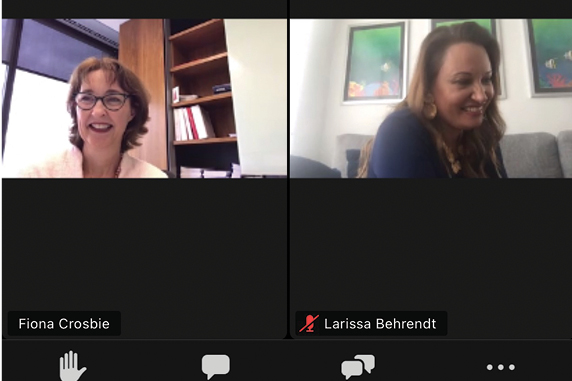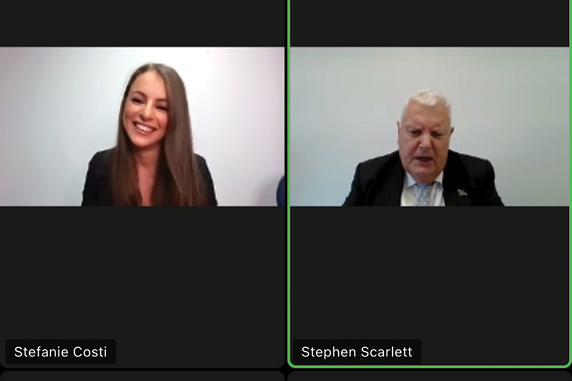The impression you get is that once you’re in one of those big firms, your job is going to be secure. It was a bit of a shock.
COVID-19 has dramatically affected the graduate experience for young lawyers, but what does it mean for their future?
Five years of exams, about $50,000 in debt and countless hours spent studying in a silent law library – but there’s a job at the end of it, right?
Wrong. In 2020, COVID-19 took away job security for law graduates almost overnight.
Simone La Martina, a law graduate and former paralegal at a top Sydney law firm, knows this better than anyone. Just two weeks into her new role, La Martina was let go from the firm along with a number of other paralegals.
“The impression you get is that once you’re in one of those big firms, your job is going to be secure. It was a bit of a shock,” she tells LSJ.
“I had left a stable job to take up this new role at a firm that I was really excited about. It was very upsetting because it all changed so quickly.”
Like many graduates, La Martina chose to study a combined law degree to improve her chances of securing a job post-graduation. After five years studying at the University of Sydney, she finally got her foot in the door at a big law firm – only to be let go as soon as the pandemic hit.
“It left me thinking, what do I do?” she says.
La Martina describes the experience as demoralising, in part because she was ineligible for JobKeeper having only worked at the firm for three weeks. Her plans to move out of home were put on hold indefinitely and she was forced to go on JobSeeker.
“It certainly wasn’t the year I envisaged,” she says.
“On JobSeeker, I have to prove that I’m always applying for work. It just made this past year feel a little chaotic. I feel a bit lost in a lot of ways because there’s no clear path to get out of this situation. It feels like I’m starting from scratch again.”
La Martina bonded with several other paralegals who were let go from the firm, and acknowledges it was definitely worse for those who didn’t have the option to live at home.
These adversities are not unique to La Martina. Her partner is also a young lawyer and experienced a significant pay cut right after being promoted.
Despite the situation, she maintains a positive outlook.
“I used the time to get my practical legal training (PLT), to upskill in other areas, and to pursue other interests that I’d always wanted to try but hadn’t had the time,” she tells LSJ.
“You just have to try and find the silver linings and maybe accept that you’re not going to be buying a house anytime soon.”
 Simone La Martina, law graduate
Simone La Martina, law graduate
A new experience
Most graduates began their program remotely in March 2020 and it hasn’t been without its challenges.
Despite numerous Zoom meetings, many admitted to finding it difficult to be seen and engage with other teams. Since returning to the office, they have noticed a huge difference.
Another key change to the graduate program is the structure itself. Thomson Geer have pushed their rotations back to allow graduates to start in a new team in person. Some law firms have cancelled their graduates’ second rotations all together, which has caused disappointment for some.
Jo McAlpine, Head of Talent and Capability at King & Wood Mallesons, says their 2020 graduates will now do two rotations instead of three.
“After six months, they would usually rotate into another team, but we decided to pause on the rotation because we wanted to give graduates more time to learn the skills in their existing practice group,” McAlpine tells LSJ.
Arguably the most significant change to firm graduate programs was made by Gadens, which chose to defer its graduates for an entire year.
“We formed the view very early on that they would not have the right kind of experience to set them up for success in their lives and careers if we continued in a totally remote program,” Gadens CEO Mark Pistil says.
While some of their graduates worked as paralegals throughout the year, the actual graduate program was put on hold.
“I’m used to an environment where young lawyers sit behind me and listen to how I interact with clients, to learn our client manner but also to correct me if I refer to a case that’s been overruled in the past 20 or 30 years,” Pistil says.
“I just see that mentoring interaction as critical to setting those people up and, based on the fact that we couldn’t deliver that in a remote environment, we adopted the approach that we did.”
COVID-19 has not just changed the nature of graduate programs but also the clerkship process. Genevieve Couvret, a law student at the University of Sydney, felt anxious when applying for clerkships in 2020.
“Four months of character scrutiny in an inherently comparative process is stressful regardless, so it was especially hard knowing there were fewer spots available at the end,” she says.
“The remote process was a bit lonely. I think there’s a social aspect, rapport and ability to imagine yourself in a space that is definitely lost through an online recruitment process.”
Coco Frolich, another law student, echoed Couvret’s concerns that it was difficult to get a feel for the culture of law firms in a remote setting.
“I worry that it will be difficult to build strong working relationships when those interactions are missing at the start of your legal career,” she says.
 Fiona Dernikovic, Director at FinLaw
Fiona Dernikovic, Director at FinLaw
I know graduates get told that the clerkship route is the be all and end all but in actual fact, if they look a little further afield they might find something completely different that they really enjoy.
No pause for celebration
Another loss felt by young lawyers was the removal of the prestigious admission ceremonies.
Law graduates Stefanie Costi and Stefani Janson both had their ceremonies cancelled in 2020, prompting them to start the Amicus Curiae Project.
Amicus gathered over 500 responses from young lawyers about why admission ceremonies are important to them and what they think should be in their place.
“Law school took a big toll on me, it broke me. I was the first lawyer in the family and I really wanted that ceremony to kind of recognise that achievement,” Costi tells LSJ.
“It’s of sentimental value: I’ve lost a lot of family members in my life and I know that sharing milestones with them is the most important thing.
“It was frustrating that you could go to an NRL game, but you couldn’t go to an admissions ceremony.”
Similarly, Janson felt disappointed about the lack of celebration, particularly given she had spent 10 years at university while working multiple jobs.
“The admission ceremony is important to me. I’ve done a fair bit of grunt work to get to this stage and it’s a big deal for my family,” she says.
Both Janson and Costi worked together to add some celebration to the process. They organised for some of the profession’s biggest names to carry out virtual admission celebrations for those who missed out in NSW and Victoria. “We just wanted graduates in 2020 to get the same treatment as people in every other year,” Costi says.
In NSW, they held a virtual admissions celebration in December with a star-studded panel of legal experts sharing advice for the future. The panel included Governor Margaret Beazley, former Justice Michael Kirby, Professor Larissa Behrendt and former Judge Stephen Scarlett.
“The idea was to take a moment to acknowledge the achievements of people and collectively get the legal profession together,” Janson says.
“We really wanted to create some sort of COVID safe way that we could celebrate but also make sure that it’s accessible to everybody.”
Taking the less traditional path
The scarcity of positions is forcing young lawyers to look for alternative opportunities in law.
Fiona Dernikovic, Director at FinLaw, created such an opportunity by launching a sister brand called ParaLaw, which matches junior lawyers with in-house corporate teams.
“We bring together the in-house corporate teams – who still need resources but have tighter budgets – with junior lawyers who might have to look outside the traditional law firm for a role,” she tells LSJ.
“ParaLaw is about matching these young graduates or paralegals to roles in corporate organisations,” she says.
Dernikovic highlights the disparity between the number of young lawyers looking for a role and the number of roles available to them as a result of COVID-19. Clerkships are competitive in the best of conditions and firms are being forced to take on lower numbers.
“There’s going to be a bunch of great lawyers who miss out, which is pretty disappointing for them,” she says.
“In a way, it means the in-house corporate teams are potentially getting access to the top candidates who in other years would have got a clerkship.”
Dernikovic encourages young lawyers to think about an in-house role, as it can provide great commercial experience and exposure to the drivers underlying a transaction.
“I know graduates get told that the clerkship route is the be-all and end-all, but, in actual fact, if they look a little further afield they might find something completely different that they really enjoy,” she says.
“Possibly, COVID-19 might actually bring a few people some different opportunities that they wouldn’t otherwise have taken.”
Elizabeth McDonald, Property Law Specialist at SWS Lawyers, is also providing an opportunity for graduates in Newcastle. Despite the firm’s small size, they went ahead with the summer clerkship program.
“We are really committed to giving Newcastle graduates an opportunity to do Sydney-style work in a regional location,” McDonald tells LSJ.
“The obvious thing for a firm of our size would be to say that we’re not doing it this year, but we decided it was really important to make it happen because we’re committed to our graduates.”
During the pandemic, McDonald made herself more accessible and implemented formal meetings with the graduates to discuss the firm’s matters and the approach taken. In previous years, graduates just dealt with matters on a case-by-case basis.
“It was interesting, because I think the graduates got something different out of that more formal approach,” she says.
“I don’t know if it’s better or worse, but I do think it was a chance for them to have a different learning experience.”
McDonald notes one of the positives of remote working is that graduates have taken the lead with technology.
“In one case, one of our graduates really took the reins. It was early on in the pandemic and I hadn’t been in the habit of using Zoom, so she sorted it out and spent quite a bit of time talking with the client and their team to arrange it,” she says.
“There were some interesting opportunities to take a leading role and have those incidental conversations with the client due to the changes and reliance on tech.
“Several months on, that graduate has a really strong relationship with that client because she had that chance to warm up.”







